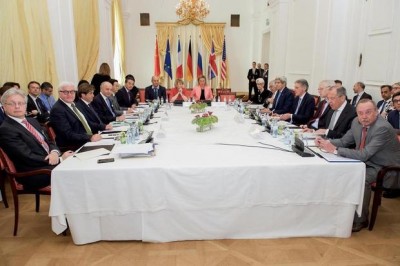The Wedge of Policy: The Iran Nuclear Deal and its Consequences

There is nothing rosy about it. The Iranian nuclear deal has, as it designation, a less glorious, bauble-laden name. It is much like babble creek, a procedural confection born from long hours of diplomatic chatter. The history books will have a rather boring entry: the Joint Comprehensive Plan of Action (JCPOA). The analysts may be more excited, but greater thrill will be gained from the detractors and polemicists waiting for its failure. Many would like war; some would like subjugation.
What will issue from it? For one, it states that the Iranian nuclear program will be peaceful in orientation, with the state affirming never to “seek, develop or acquire nuclear weapons.” For another, this is to be exchanged for “the comprehensive lifting of all UN Security Council sanctions as well as multilateral and national sanctions related to Iran’s nuclear programme.” Sanctions relief will cover investments, import and transport of Iranian oil, bilateral trade, banking, importation of goods and those targeting specific entities and individuals.
The nitty gritty aspect is less interesting, pivoting on enrichment, enrichment R&D and stockpiles, and the redesigning of Arak as a modern heavy water research reactor in the name of industrial and medicinal research. Centrifuge numbers are to be slashed by two thirds. There is to be 98 per cent stockpile reduction. This will have the involvement of the Working Group comprising representatives of the P5+1.
But sovereignty snipping measures are outlined in the form of increased inspections on the part of the International Atomic Energy Agency, which are deemed, rather blandly, to be done in the name of transparency. Then, as ever, a dispute resolution mechanism is embedded.
The document is also drafted in the language of expectation and reward which take the form of milestones – “Implementation Day” will take place simultaneously with verification that Iran was discharged preliminary obligations. But prior to that comes Finalization Day and Adoption Day. One thing distinctly absent from this is “Independence Day,” a concept seemingly reserved for others.
The agreement has its problems, one of them being the near perverse singularity of targeting a state from acquiring or developing nuclear weapons. Iran must, effectively, be made to be especially compliant, an example of international probity in the non-proliferations market. “We’ve locked Iran’s nuclear program in a box,” writes Brendan Gilfillan, “and now we’re putting a camera on it.”[1]
For all that, there are the glory mongers who see greater cooperation between Tehran and Washington, a sort of ad idem revelation that will bring a greater nose-to-nose understanding about how best to deal with regional threats. There are such issues as Islamic State, after all, doing more than their fair share of damage.
This immediately falls into a quagmire in the Middle East, where both countries back and sponsor regimes at odds, often of the bloody sort, with each other. The United States continues to bed its unfaithful mate in Riyadh, bearing witness to a brutal campaign in Yemen, to take but one example. Mortal enemies gaze across the Arab-Persian divide.
There are also troubles in the United States. The Republicans are already dooming the arrangement, regarding it as something close to the clap of foreign policy. This was dangerous intercourse, and one Obama went into without sufficient protection. Yes, Washington did get something of a deal, the murmur in the wind of negotiations akin to a courtesan’s promise, but there came, along with that, Israel’s rage and boundless scepticism.
From the start, Benjamin Netanyahu made it clear that no deal was the best deal possible. He made it clear to Israel’s voters. He made it clear to the US Congress. Iran could never have anything remotely resembling a nuclear option, civilian or otherwise. A form of servitude policed by international guidelines is something Israel has long encouraged, while always retaining its own undisclosed nuclear values.
The game on the part of Netanyahu is always to insist that the mullahs are, not merely a problem for Israeli security, but that of the United States. “We think this is not only a threat to us,” warned the Israeli prime minister gravely on NBC. “We think this is a threat to you as well.”
Much of Netanyahu’s legwork was already being done by the American-Israel Public Affairs Committee, the self-touted “Pro-Israel Lobby” of the United States. Its talking points of June 25 were already clear on what it considered a “deal” that would fall “short of US objectives”. Such a deal would increase the prospects for war; allow Tehran to develop a nuclear weapon; provide succour for regional proliferation (no mention, of course, of Israel’s role here) while undercutting “US credibility” and encouraging terrorism.[2]
The GOP thermostat remains timed to Israeli temperature, and that has not been rather agitated of late. The entire Iranian affair has muddled it. House Speaker John Boehner, R-Ohio, could not fathom on Thursday why “the administration would agree to lift the arms and missile bans and sanctions”.[3] Never deal with the wily Persian, because the state of Israel says so.
Nor does this situation demand any literacy as such, at least if you are Gov. Scott Walker of Wisconsin. Should he reach the White House, he would “terminate the bad deal with Iran” – even without reading it. Now that would be a recipe for a lovely war.
Dr. Binoy Kampmark was a Commonwealth Scholar at Selwyn College, Cambridge. He lectures at RMIT University, Melbourne. Email:[email protected]
Notes
[1] http://talkingpointsmemo.com/

